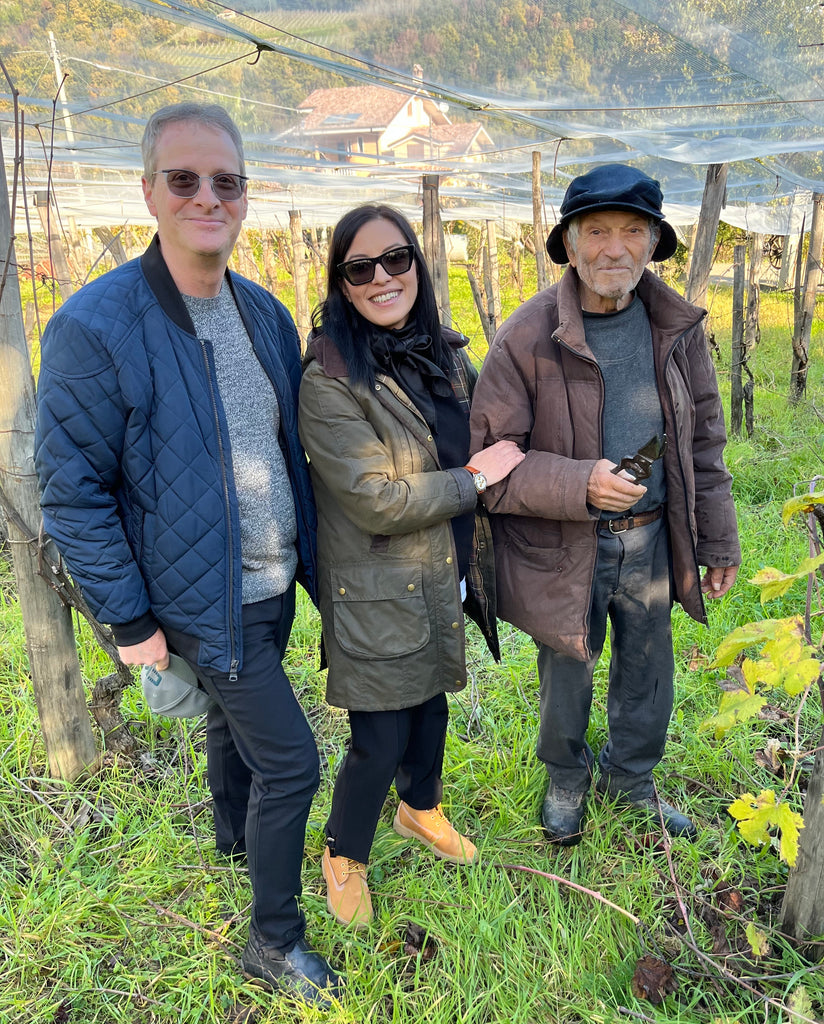Our tasting impressions
That is such a deep, alluring and electrifying nose! Nothing in my wine experience prepared me for this wine. It doesn't taste anything like it, but you would expect to encounter a wine like Mèrcori in the cellar of a grand chateau along Bordeaux's left bank - but this is Paestum. The flavors are explosive and myriad. Tannins are silky smooth but significant. The wine is majestic yet comforting, intense but subtle, sophisticated while homey and intriguing though somehow familiar. It is even more unfathomable that it could be this complete in just its second vintage. A magnificent, beautiful anomaly that we will be pleased and proud to have in our cellar and on our table. Experience it and enjoy, but please be patient (it may not be obvious with all that is going on, but this wine is tight and tannic) as this wine, over time, delves its extraordinary potential.
About this wine
Just the second vintage of Francesca's top wine. Mèrcori is a field blend and truly an expression of a single vineyard created by Luigi and trained in the Guyot system. A variety of grapes are grown on this 40° slope with .8 ha of vines on French and American rootstocks. The soil is rich in limestone, clay and marl. At the top of the slope - about 250 meters, she pours the must from the previous vintage to fertilize.
The 2,500 vines are 30% Aglianico, 30% Cabernet Sauvignon, 10% Barbera, 10% Sangiovese (planted 70 years ago) and 20% other native varieties - mostly Aglianicone (a relation of but not a clone of Aglianico).
Harvesting, by hand, commenced October 6th. The grapes are sorted and selected twice - once in the vineyard and again in the cellar on a vibrating table. The grapes are pressed and then the stems, separately. Fermentation is in plastic vats. Maceration is 30-40 days with punch downs.
The wine is moved to neutral French tonneaux (some new, some up to 3 years old) to age for up to 2 years. The wine from each variety is blended in Botti and then transferred to tanks for bottling, where it rests for another year. With pen in hand, Francesca numbers each of the 1,287 bottles.
About the grape
Aglianico is one of Italy's 3 most prestigious grape varieties - along with Nebbiolo and Sangiovese. Grown mostly in southern Italy, it's at its best in warm, dry climates like Campania and Basilicata. Cabernet Sauvignon, famous the world over, is hearty fruit that flowers and ripens late. It is highly adaptive to a wide variety of climates and soils. Its vines are capable of prodigious production, which must be restricted in order to produce the grape's best quality. Barbera is a dark-skinned grape from vigorously growing, easy to manage vines. It is high in acidity, low in tannins and light-bodied. Sangiovese is the most planted grape in Italy. It is dark and thick-skinned, slow-ripening, acidic and tannic.
Francesca's thoughts on the vintage
A vintage that will be remembered for its quality, not its quantity. Three factors led to the reduced production: a late frost, low rainfall in the winter and spring, and soaring August temperatures the first week of August. Fortunately for most of the summer, the temperature variations between day and night were ideal, so already the grapes were healthy with excellent aromatic and phenolic ripeness.
On your table
If Mèrcori is on your dinner table, keep the food simple and elegant. Beef tenderloin with some pan juices, mashed potatoes and carrots. There can't be two stars in this show and I guarantee you that anything that tries to compete, will lose. Tonight, it's about the wine (hopefully you remember to give it a long decant)!
Francesca Fiasco is young, passionate and driven. Since 2015, she has relentlessly worked the land and cellar her grandparents started many decades ago in the beautiful Cilento National Park (a preserve that prohibits any industrial activity). Everything she knows about farming and wine she learned from her Nonno. More than 90 years old, Luigi still tends the vines.
From the 6.5 hectare farm (comprised of various small vineyards), Francesca produces less than 20,000 bottles per year from a mixture of traditional local grapes, some typical of other regions of Italy and one conspicuous interloper from France - Cabernet Sauvignon. Production of her 4 wines is unconventional - it's Nonno's way - but the results are remarkable. The expectation from a farm like this, in an area like this, is that the wines will be rustic, simple and honest. Instead, we find sophistication and complexity without compromising a clear expression of the place they come from.
To say that this is manual labor is an understatement. It starts with the grapes for each wine being harvested separately and concludes with Francesca writing notes on each case of wine leaving her cellar. Her devotion and determination are undeniable. The wines from Paestum may not be well-known or highly regarded but don't tell her that - nor does anyone who has tasted her wines much care. Wow, what a discovery! Only the great story of this family and Francesca's project can outshine her wines.
